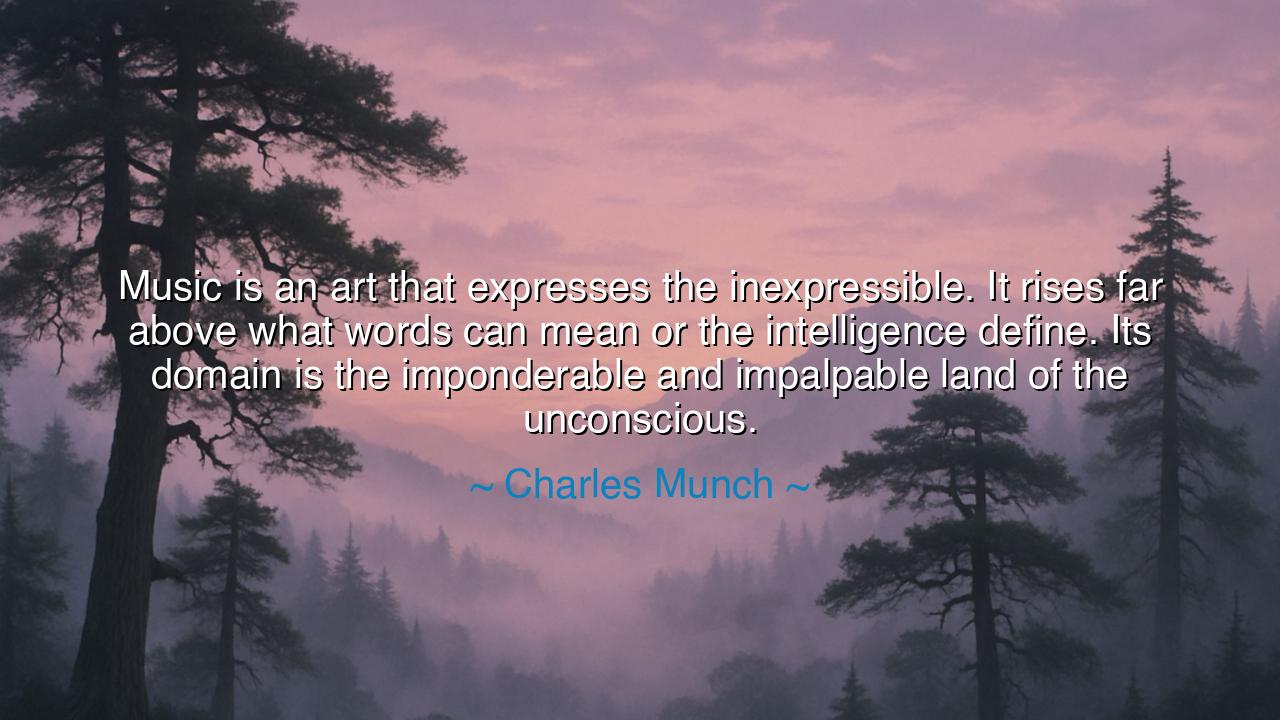
Music is an art that expresses the inexpressible. It rises far
Music is an art that expresses the inexpressible. It rises far above what words can mean or the intelligence define. Its domain is the imponderable and impalpable land of the unconscious.






Here is an ancient-style reflection on Charles Munch’s quote:
The Song Beyond Words
When Charles Munch said, “Music is an art that expresses the inexpressible. It rises far above what words can mean or the intelligence define. Its domain is the imponderable and impalpable land of the unconscious,” he was not speaking merely as a conductor or musician, but as a philosopher of the soul. His words echo through time as a hymn to the mysterious power of music — that art which transcends thought and reason, touching the very fabric of the human spirit. For where speech ends, music begins, and where knowledge falters, feeling takes flight.
The ancients understood this truth. Long before the written word, there was song — the sound of breath turned into meaning, the voice of humanity’s first prayers and dreams. Munch’s insight reminds us that music is not made of notes alone, but of something vast and ungraspable — the unconscious, the deep sea beneath the mind where joy, sorrow, memory, and mystery dwell. Words can describe; music reveals. Words can persuade; music transforms.
In every age, the greatest souls have turned to music to speak what their tongues could not. Consider the story of Beethoven, who, when robbed of his hearing, still composed his symphonies — not for the ears of others, but for the eternity within himself. Deaf to the world, he heard the universe. His Ninth Symphony, composed in silence, is a cry from the imponderable land of the spirit, where emotion defies reason and beauty flows unbound. Through his suffering, he proved that music is not heard with the ear, but felt with the heart.
Munch’s origin as a conductor of immense passion and precision gives his words special power. He stood before orchestras like an ancient priest before the altar, summoning the divine from the invisible. In his hands, music became more than performance — it became revelation. He understood that to create true art, one must surrender intellect to intuition, structure to soul. For the unconscious — that hidden landscape of dreams and instinct — is not chaos, but the birthplace of creation.
Music, as Munch tells us, belongs to the realm beyond thought, where all opposites dissolve. Joy and grief, hope and despair — all find their place in the same harmony. When the melody rises, it carries with it the laughter of children and the weeping of the old; when it falls, it whispers of loss, of longing, of eternal return. This is the power of the inexpressible: it binds us to one another, not by logic, but by shared emotion. It is the universal language of the soul, older than nations, truer than speech.
Yet, there is also a warning in his words. In our age of calculation and noise, many seek to measure what cannot be measured — to define art, to analyze beauty, to trap inspiration in theories. But Munch reminds us that the intelligence of the heart is greater than the intelligence of the mind. To live fully, one must learn again to listen — not only to the music of instruments, but to the music within life itself: the wind through leaves, the rhythm of footsteps, the silence between breaths.
Therefore, O seeker of wisdom, take this lesson to heart: music is the mirror of the soul. When words fail you, when reason grows cold, turn to the song that lives in all things. Listen not only with your ears, but with your being. Let the music of life remind you of what cannot be spoken — your love, your loss, your hope, your wonder. For in listening deeply, you awaken the part of yourself that is eternal.
And know this final truth: the world itself is a symphony, and you are both its note and its listener. Live, then, as one who belongs to the unseen harmony — a soul attuned to the beauty that lies beyond words, beyond thought, in the boundless, singing heart of existence.






AAdministratorAdministrator
Welcome, honored guests. Please leave a comment, we will respond soon